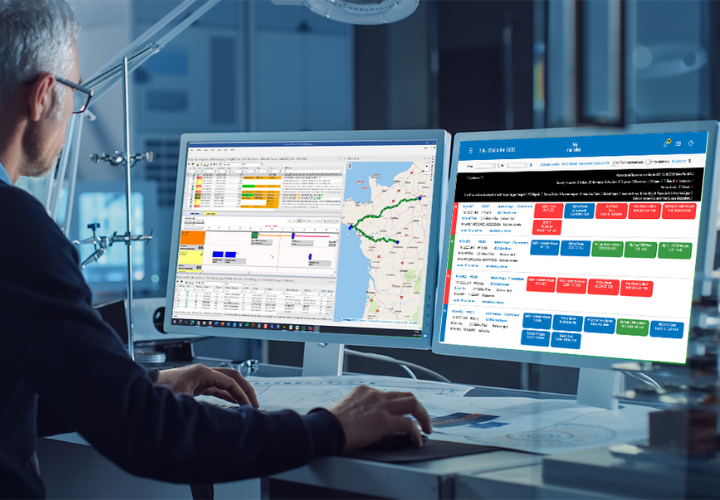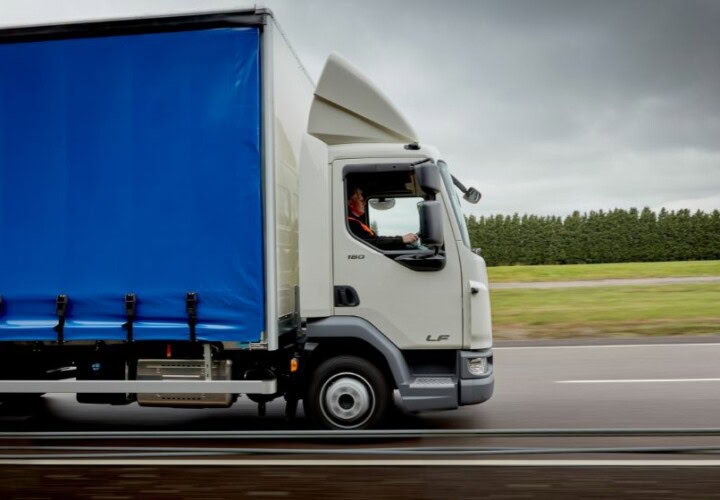More than fleet telematics
Microlise’s integrated vehicle telematics system helps fleet operators to reduce costs, improve safety, efficiency and compliance, and support stronger driver performance, our vehicle telematics help you to:
Microlise’s integrated vehicle telematics system helps fleet operators to reduce costs, improve safety, efficiency and compliance, and support stronger driver performance, our vehicle telematics help you to:

Fleet vehicle tracking provides you with detailed intelligence and visibility of the current and historical activity of your fleet.

Feed real-world information back into your planning process to optimise utilisation levels and fleet route efficiency.

Empower your drivers to improve and realise significant fleet efficiency gains simultaneously.

Enable proactive communications with customers with a cost effective and intuitive communications platform.

Optimise your trailer fleet - improve safety. security, delivery assurance and ROI.

Monitor refrigerated units, ensuring that the temperature across trailer zones is at optimum levels for vital supplies.

Simplify navigation with truck-optimised routes that cater to larger vehicles for more efficient journey planning.
Enhance driver safety with hands-free calling and easy access to essential contact information.

Focus is a powerful enterprise grade telematics solution, specifically designed for smaller fleets.
With efficiency, safety and security looming large on any fleet operator’s agenda, Focus provides smaller operators with the same level of data and fleet performance intelligence that you’d expect from a telematics solution for larger enterprises.
See our Temperature Monitoring product
Fleet telematics is a technology that involves the tracking, monitoring, and management of a fleet of vehicles using a combination of telecommunications and informatics. It typically utilises GPS (Global Positioning System) and onboard diagnostics to gather data from vehicles in real-time. This data includes information about vehicle location, speed, fuel consumption, driver behaviour, and more.
Fleet telematics systems provide valuable insights for businesses with vehicle fleets. These insights can be used to enhance operational efficiency, improve driver safety, reduce fuel costs, and optimise routing and scheduling. Additionally, fleet telematics can aid in maintenance management by providing data on vehicle health and performance. Overall, fleet telematics plays a crucial role in helping businesses make informed decisions, reduce operational costs, and enhance the safety and productivity of their mobile assets.
Fleet telematics offers a range of benefits for businesses with vehicle fleets. These include improved operational efficiency, enhanced driver safety, reduced costs, and better decision-making.
1. Improved Efficiency: Telematics provides real-time data on vehicle location, enabling businesses to optimise routes, reduce idle time, and enhance overall productivity.
2. Enhanced Driver Safety: Telematics monitors driver behaviour, helping to reduce risky actions like speeding and harsh braking. This promotes safer driving and lowers the risk of accidents.
3. Cost Reduction: Telematics can lower fuel costs by optimising routes and reducing idling. It also aids in preventive maintenance, minimising costly breakdowns.
4. Better Decision-Making: Data-driven insights from telematics enable informed decisions on fleet management, such as choosing the most efficient vehicles and routes.
5. Customer Satisfaction: Improved route optimisation and accurate ETAs lead to better service, increasing customer satisfaction.
6. Regulatory Compliance: Telematics helps with compliance by providing records of driver hours and vehicle maintenance.
7. Theft Prevention: Tracking and remote shutdown capabilities deter theft and aid in recovery.
Fleet telematics is a powerful tool for businesses seeking to enhance efficiency, safety, and cost-effectiveness in their vehicle operations.
Using a fleet telematics system is essential for businesses with vehicle fleets for several compelling reasons.
1. Operational Efficiency: Telematics provides real-time data on vehicle location and performance, allowing for optimised routing, reduced idle time, and overall operational efficiency.
2. Cost Savings: It helps lower operational costs by improving fuel efficiency, reducing maintenance expenses through predictive maintenance, and lowering insurance premiums by promoting safer driving.
3. Enhanced Safety: Telematics monitors driver behaviour, promoting safer driving practices and reducing accidents, which can result in lower liability costs and a safer work environment.
4. Improved Customer Service: Accurate tracking and estimated arrival times lead to better customer service, increasing satisfaction and loyalty.
5. Compliance: Telematics aids in regulatory compliance by providing records of driver hours and maintenance, ensuring businesses adhere to legal requirements.
6. Data-Driven Decisions: The wealth of data collected enables data-driven decision-making, enhancing fleet management and strategic planning.
In summary, a fleet telematics system is a valuable tool for businesses aiming to optimise their fleet operations, reduce costs, enhance safety, and provide superior service to customers.
The accuracy of fleet telematics is generally quite high. Modern telematics systems rely on advanced GPS technology to track vehicle location, and they have become increasingly precise over the years. GPS accuracy can typically pinpoint a vehicle's location within a few meters. This level of accuracy is more than sufficient for most fleet management applications, such as route optimisation and monitoring driver behaviour.
However, it's important to note that there can be occasional limitations to accuracy, especially in areas with poor GPS signal reception, such as urban canyons or heavily wooded regions. In such cases, the accuracy may temporarily decrease. Nonetheless, advancements in telematics technology, including hybrid systems that combine GPS with other positioning methods, are continually improving accuracy and reliability, making fleet telematics a highly effective tool for businesses to manage their vehicle fleets.